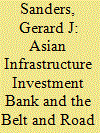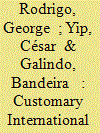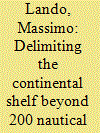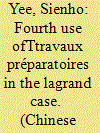|
|
|
Sort Order |
|
|
|
Items / Page
|
|
|
|
|
|
|
| Srl | Item |
| 1 |
ID:
155111


|
|
|
|
|
| Summary/Abstract |
. Hong Kong is a place which has a possibly unparalleled tradition of looking outwards, toward the world’s largest ocean and out across its greatest landmass. The vast amount of wares and funds that have passed through the territory, and the services that have been provided from within its shores, have not only supplied the economic lifeblood of a great city but have helped forge a society committed to free markets and the fostering of trade and investment and one which is receptive of ideas carried from abroad. All of this has been underpinned by the role law plays in Hong Kong in respecting bargains made and providing the framework in which business is conducted, disputes resolved and obligations enforced. Hong Kong, undoubtedly, is one of the world’s great legal centres.
|
|
|
|
|
|
|
|
|
|
|
|
|
|
|
|
| 2 |
ID:
155107


|
|
|
|
|
| Summary/Abstract |
The article examines the recent debate between the experts of the Asian-African Legal Consultative Organization and the International Law Commission on the identification of Customary International Law in light of the marginal role that the Third World has played in customary law-making. During the decolonization period, recently independent states and their scholars were quite resistant towards customary law. This cautious stance is justified by the central role of power in the formation of customary rules. Though the doctrine of sources underwent significant reforms during this chapter, recent developments such as the acceleration of custom, the greater role of international organizations and the persistent objector doctrine have not been able to alter this undemocratic bias. Therefore, one should be aware of these limitations when engaging CIL from a Third World perspective.
|
|
|
|
|
|
|
|
|
|
|
|
|
|
|
|
| 3 |
ID:
155104


|
|
|
|
|
| Summary/Abstract |
In both Nicaragua v. Colombia cases, the International Court of Justice upheld that international tribunals may delimit the continental shelf beyond 200 nautical miles prior to the establishment of the continental shelf’s outer limits. However, both the 2012 judgment on the merits in the first case, and the 2016 judgment on preliminary objections in the second case, raise a number of controversial issues. This article discusses the contentious aspects of these two judgments. First, it argues that the ICJ’s decisions should have more strongly upheld that overlapping entitlements are a necessary precondition to maritime delimitation both within and beyond 200 nautical miles, with reference to the evaluation of evidence of entitlement provided by the parties. Second, it examines the exceptional character of the Bay of Bengal cases, as well as the persuasiveness of the “practical impasse” argument invoked by Nicaragua.
|
|
|
|
|
|
|
|
|
|
|
|
|
|
|
|
| 4 |
ID:
155105


|
|
|
|
|
| Summary/Abstract |
Unilateral coercive measures are condemned by the UN General Assembly on a yearly basis for being contrary to international law and for having negative effects on human rights and the economy of developing States. Although legal doctrine generally finds that the limitations of economic coercion are a grey area of international law, these resolutions could be indicative of an emerging prohibition. Upon closer scrutiny, however, it would appear that they do not satisfy the required criteria—as developed by international jurisprudence and doctrine—for establishing a new custom. That being said, the resolutions clearly illustrate a divide between developed and developing States on the legitimacy of unilateral sanctions that should not be dismissed. In the interests of understanding how this division came into existence and how we can overcome it, the article proceeds to address the social factors that lead to its creation.
|
|
|
|
|
|
|
|
|
|
|
|
|
|
|
|
| 5 |
ID:
155110


|
|
|
|
|
| Summary/Abstract |
Under the customary international law on the interpretation of treaties as reflected in Articles 31-32 of the Vienna Convention on the Law of Treaties, the travaux préparatoires of a treaty may be resorted to in order to confirm the meaning resulting from the application of the general rule in Article 31, to remove an ambiguity, or to cure a manifestly absurd or unreasonable result. The International Court of Justice divined a fourth use of travaux préparatoires—to prove the non-preclusion of an interpretation—in the LaGrand case. This use provides some additional comfort to the interpreter of a treaty provision that the interpretation reached through an exercise under Article 31 is not negatively affected by the travaux or is not definitely wrong. This use has also been extended by the Court to the use of context as well as text in treaty interpretation.
|
|
|
|
|
|
|
|
|
|
|
|
|
|
|
|
| 6 |
ID:
155106


|
|
|
|
|
| Summary/Abstract |
This paper maps the international legal framework of monetary relations as between the States in Northeast Asia (China, Japan, Korea) (hereinafter “NEA”). To this end, it focuses on bilateral, regional and multilateral arrangements that are relevant in the monetary relations as between the NEA States, including aspects of the domestic monetary governance apparatus of the respective States as it concerns Central Banks in the region. Additionally, the paper focuses on the capacity of the IMF and its normative framework to manage regional conflicts and integration efforts in the monetary sphere falling short of Currency Unions. This legal mapping of the monetary relations between the States in NEA is followed by some reflections on the ethical aspects of what monetary relations should be informed by generally and in particular as between neighbouring States. More generally, the paper addresses the capacity of the IMF to focus on regional monetary issues; and important monetary challenges that confront NEA from an international legal perspective. This focus involves considering such issues as financing of balance of payments deficits in times of crisis; and monetary co-ordination, currency intervention and responsibilities arising from acquiring an international currency status.
|
|
|
|
|
|
|
|
|
|
|
|
|
|
|
|
| 7 |
ID:
155109


|
|
|
|
|
| Summary/Abstract |
Since the Pinochet judgment in 1999, the torture exception to foreign official immunity in domestic courts increasingly seems to have acquired an established status, in order to better enforce prohibition against torture. The recent Fifth Report of the UN International Law Commission’s Special Rapporteur on Immunity of State Officials from Foreign Criminal Jurisdiction casts this exception to State official immunity as a basically non-controversial issue. But a deeper analysis of the reasoning originated by Pinochet, against a backdrop of most recent scholarship, reveals a rather weak doctrinal foundation. The article explores the four main theories behind this exception claim, one after another, i.e. jus cogens, universal jurisdiction, characterization of torture as a non-official act, and dual responsibility for re-categorized torture acts, and points out the problems therein, albeit without rushing into hasty solutions.
|
|
|
|
|
|
|
|
|
|
|
|
|
|
|
|
| 8 |
ID:
155108


|
|
|
|
|
| Summary/Abstract |
China and Western countries have repeatedly portrayed each other as potential or actual adversaries in cyberspace. Yet, both sides proclaim that they subscribe to an international consensus that cyber operations must be subjected to the rule of law. Against this background, the article examines five key aspects of the rule of law in cyberspace, which are ordinarily understood as areas of contention: (1) preferred method of identification and development of international law; (2) competing models of cyberspace governance; (3) application of sovereignty to cyberspace; (4) question of militarization of cyberspace; and (5) legality of cyber espionage. Our analysis demonstrates that it is inaccurate to view China and the West as sharply divided and competing camps. Rather, the emerging picture reveals a web of relationships and views that reflect an overall trajectory of convergence, even if modest in scope and velocity.
|
|
|
|
|
|
|
|
|
|
|
|
|
|
|
|
|
|
|
|
|